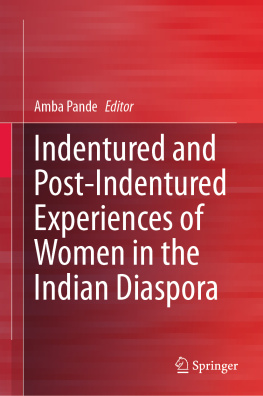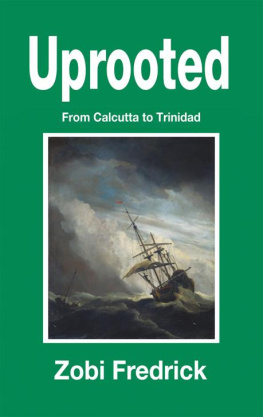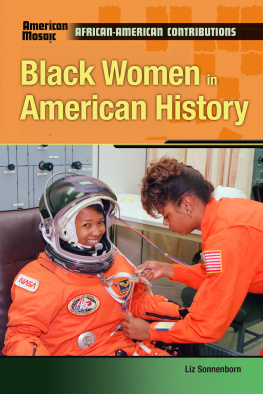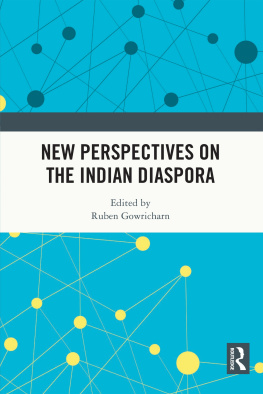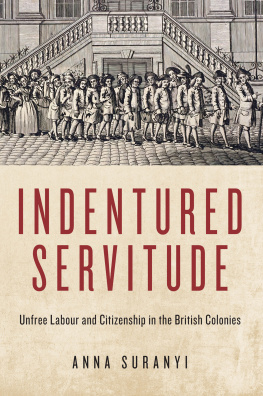Amba Pande - Indentured and Post-Indentured Experiences of Women in the Indian Diaspora
Here you can read online Amba Pande - Indentured and Post-Indentured Experiences of Women in the Indian Diaspora full text of the book (entire story) in english for free. Download pdf and epub, get meaning, cover and reviews about this ebook. year: 2020, publisher: Springer Singapore, genre: Politics. Description of the work, (preface) as well as reviews are available. Best literature library LitArk.com created for fans of good reading and offers a wide selection of genres:
Romance novel
Science fiction
Adventure
Detective
Science
History
Home and family
Prose
Art
Politics
Computer
Non-fiction
Religion
Business
Children
Humor
Choose a favorite category and find really read worthwhile books. Enjoy immersion in the world of imagination, feel the emotions of the characters or learn something new for yourself, make an fascinating discovery.
- Book:Indentured and Post-Indentured Experiences of Women in the Indian Diaspora
- Author:
- Publisher:Springer Singapore
- Genre:
- Year:2020
- Rating:5 / 5
- Favourites:Add to favourites
- Your mark:
- 100
- 1
- 2
- 3
- 4
- 5
Indentured and Post-Indentured Experiences of Women in the Indian Diaspora: summary, description and annotation
We offer to read an annotation, description, summary or preface (depends on what the author of the book "Indentured and Post-Indentured Experiences of Women in the Indian Diaspora" wrote himself). If you haven't found the necessary information about the book — write in the comments, we will try to find it.
Amba Pande: author's other books
Who wrote Indentured and Post-Indentured Experiences of Women in the Indian Diaspora? Find out the surname, the name of the author of the book and a list of all author's works by series.
Indentured and Post-Indentured Experiences of Women in the Indian Diaspora — read online for free the complete book (whole text) full work
Below is the text of the book, divided by pages. System saving the place of the last page read, allows you to conveniently read the book "Indentured and Post-Indentured Experiences of Women in the Indian Diaspora" online for free, without having to search again every time where you left off. Put a bookmark, and you can go to the page where you finished reading at any time.
Font size:
Interval:
Bookmark:
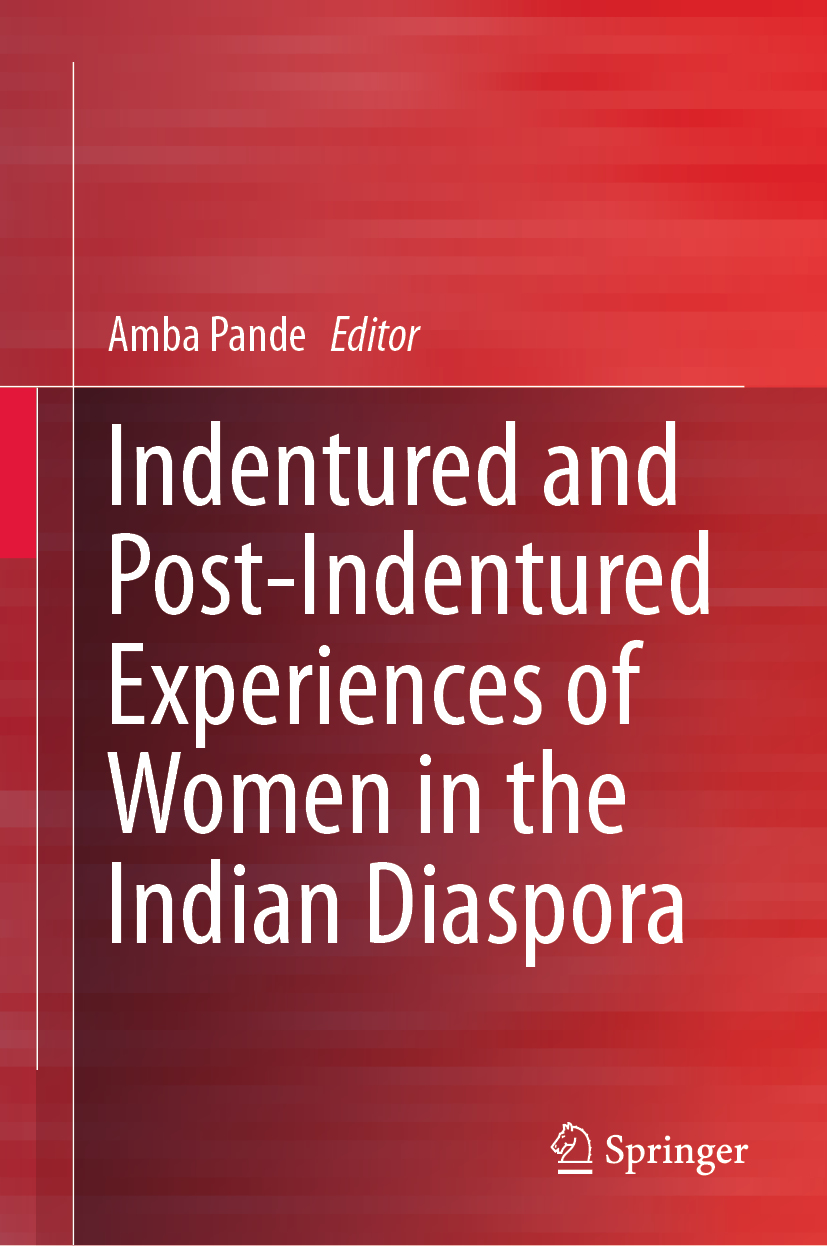

This Springer imprint is published by the registered company Springer Nature Singapore Pte Ltd.
The registered company address is: 152 Beach Road, #21-01/04 Gateway East, Singapore 189721, Singapore
Indian women have shared space with men in almost all the migration streams, including the labour migrations under the indenture system. As per the rules of indenture, there had to be a minimum of forty women per hundred men. This ratio was indeed difficult to maintain, and it is widely known that the recruiters adopted all sorts of fraudulent methods, to recruit women. But women also got recruited willingly either to escape the prevailing social conditions or to look for better economic opportunities. On the plantations, women faced the violence and abuses inherent in the system, met with the harsh and relentless work conditions, encountered the authoritarian structure of the plantations which reinforced patriarchal trends, confronted cultural and social prejudices and many other forms of exploitation. Despite these adverse circumstances which, women had to undergo, their positioning in the colonial as well as the nationalist discourses remained within the patriarchal paradigms of either powerless victims or immoral women. Their voices remained silenced and the realities of their lived lives and survival strategies were rendered invisible in the colonial historiographies.
The increasing feminisation of international migration and the recent feminist and subaltern epistemological interventions gave a stimulus to womens voices and perspective in the ongoing researches. The multidisciplinary academic engagements progressively challenged the stereotypical objectified images to bring out the multifaceted realities of women in the indenture and post-indenture period. Indian women developed innovative strategies to cope with the prevailing conditions, often, managing to turn the adverse circumstances to their advantage. They empowered themselves through education, successfully using the liminal spaces to build new identities for themselves. At the same time, they also raised families in often inhospitable circumstances passing on solid foundation to the posterity. Negotiating their way through Indian cultural traditions dominated by patriarchal norms and indentured lives at plantations they were able to recast their mesogenic stigmatization and make a critical contribution in social, cultural, economic and political formation of the fledgeling settlements which transformed into dynamic societies over succeeding generations. In so doing they subverted/transformed several established paradigms and categorizations. Womens agency was evident in their personalized as well as the collective resistances against sexual abuses by the native as well as the white men; against the exploitative labour laws and working conditions; and against the colonial system as part of satyagraha and recruits of Indian National Army.
This volume aims to capture the voices, experiences and lives of indentured and post-indentured Indian women and map their struggles, challenges, agencies and resistances. The papers included in the volume take a multidisciplinary approach and methodology to locate women at both the spheres of political economy and socio-cultural formations of the plantations of various countries and regions around the world. Such efforts help reinvent histories, loaded with colonial and patriarchal paradigms, by using memories, oral stories and personal accounts of the largely silenced sex.
I take great pleasure in acknowledging the institutions, scholars and friends who have been the source of constant support and encouragement all along. First, I would like to extend my sincere thanks to all the authors and scholars who have contributed to this volume. I would also like to thank my friends and colleagues in School of International Studies, JNU and other research organisations with which I am associated in different capacities i.e. India International Society for Eighteenth-Century Studies (IISECS), Antar Rashtriya Sahyog Parishad (ARSP) and Global Research Forum on Diaspora and Transnationalism (GRFDT). I would also like to extend my sincere gratitude to Ambassador Anup Kumar Mudgal and Shri Shyam Parande for their constant support. I would like to acknowledge the help given by my research assistant Swati Singh in referencing and formatting of the book. I also wish to acknowledge the help given by students like David Pradhan and Abhijeet. Finally, I extend my sincere gratitude to my parents, my husband, my children Aarsh and Ishita as well as my fellow practitioners of Bharat Soka Gakkai.
is associated with the School of International Studies, Jawaharlal Nehru University, New Delhi. She received her PhD from the Centre for Southeast Asia and South-West Pacific Studies, School of International Studies, JNU. Her research interests include Indian diaspora, international migration and the Indo-Pacific region. She was a visiting scholar at the University of Amsterdam (The Netherlands), University of South Pacific (Fiji), and University of Otago (New Zealand). She has done major projects on Indian diaspora with University Grants Commission (UGC) and Indian Council of Social Science Research (ICSSR). Dr Pande is a prolific writer and has published numerous papers in national and international journals. She has two more edited books to her credit,
Font size:
Interval:
Bookmark:
Similar books «Indentured and Post-Indentured Experiences of Women in the Indian Diaspora»
Look at similar books to Indentured and Post-Indentured Experiences of Women in the Indian Diaspora. We have selected literature similar in name and meaning in the hope of providing readers with more options to find new, interesting, not yet read works.
Discussion, reviews of the book Indentured and Post-Indentured Experiences of Women in the Indian Diaspora and just readers' own opinions. Leave your comments, write what you think about the work, its meaning or the main characters. Specify what exactly you liked and what you didn't like, and why you think so.

